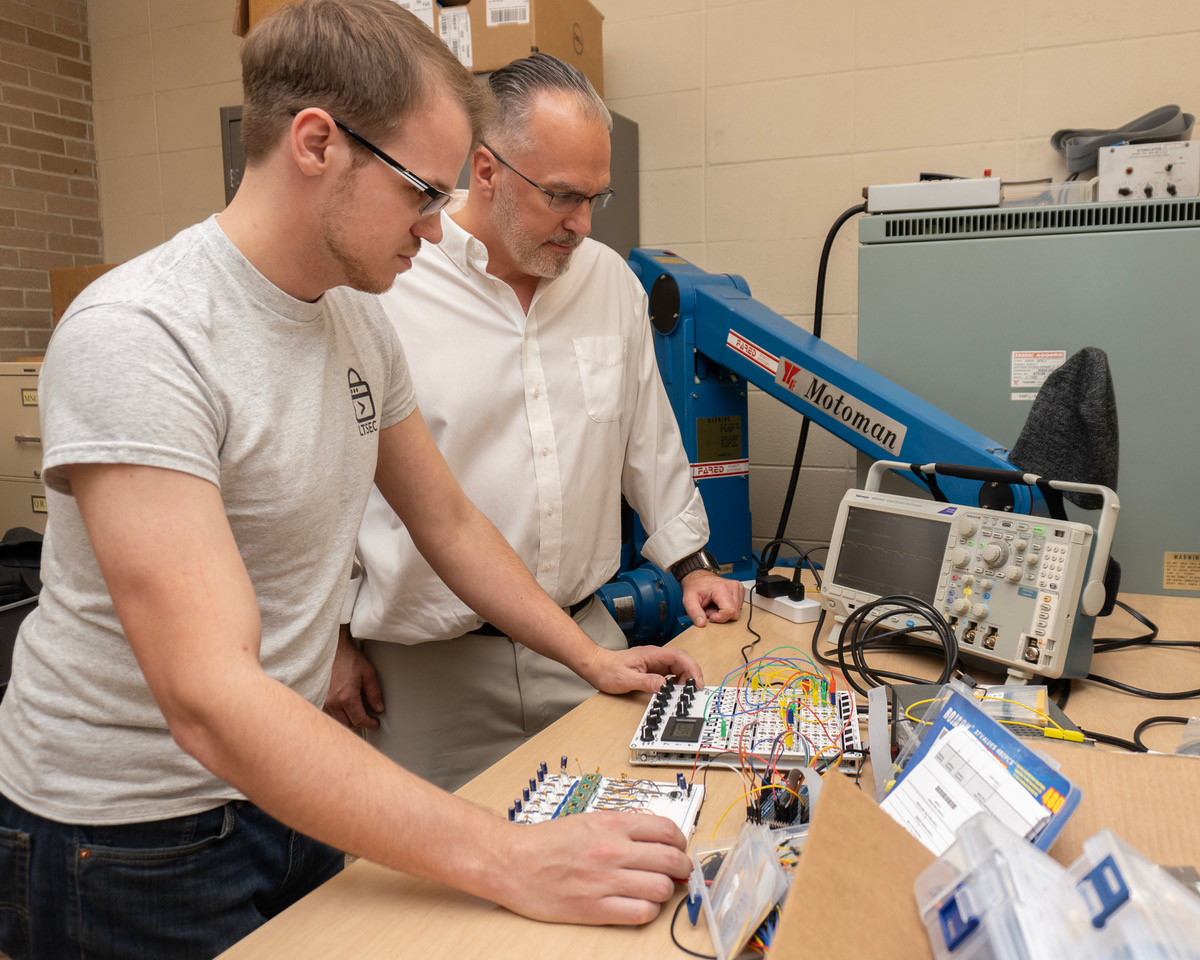[1] T. Nguyen, J. T. McDonald, W. B. Glisson, and T. R. Andel, "Detecting repackaged
android applications using perceptual hashing," 2020: Proceedings of the 53rd Hawaii
International Conference on System Sciences.
[2] A. Kumar, W. B. Glisson, and R. Benton, "Network attack detection using an unsupervised
machine learning algorithm," 2020: Proceedings of the 53rd Hawaii International Conference
on System Sciences.
[3] B. J. Hodges, J. T. McDonald, W. B. Glisson, M. Jacobs, M. Van Devender, and J.
H. Pardue, "Attack modeling and mitigation strategies for risk-based analysis of networked
medical devices," 2020: Proceedings of the 53rd Hawaii International Conference on
System Sciences.
[4] T. Flynn, G. Grispos, W. Glisson, and W. Mahoney, "Knock! knock! who is there?
investigating data leakage from a medical internet of things hijacking attack," 2020.
[5] E. Harshany, R. Benton, D. Bourrie, and W. Glisson, "Big data forensics: Hadoop
3.2. 0 reconstruction," Forensic Science International: Digital Investigation, vol.
32, p. 300909, 2020.
[6] E. Harshany, R. Benton, D. Bourrie, M. Black, and W. Glisson, "DFS3: automated
distributed file system storage state reconstruction," in Proceedings of the 15th
International Conference on Availability, Reliability and Security, 2020, pp. 1-10.
[7] L. Graves, W. B. Glisson, and K.-K. R. Choo, "LinkedLegal: Investigating social
media as evidence in courtrooms," Computer Law & Security Review, vol. 38, p. 105408,
2020.
[8] B. Al Smadi and M. Min, "A critical review of credit card fraud detection techniques,"
in 2020 11th IEEE Annual Ubiquitous Computing, Electronics & Mobile Communication
Conference (UEMCON), 2020: IEEE, pp. 0732-0736.
[9] M. U. Zaman and M. Min, "Decentrally-Consented-Server-Based Blockchain System
for Universal Types of Data," in 2020 International Symposium on Networks, Computers
and Communications (ISNCC), 2020: IEEE, pp. 1-6.
[10] M. Min, "On-Demand, Unattended Authentication: A Novel Online Access Model Without
Cumbersome Login Procedures," in 2020 IEEE 17th Annual Consumer Communications & Networking
Conference (CCNC), 2020: IEEE, pp. 1-2.
[11] S. Anand, D. Ding, P. Gasti, M. O’Neal, M. Conti, and K. S. Balagani, "DISPERSE:
A Decentralized Architecture for Content Replication Resilient to Node Failures,"
IEEE Transactions on Network and Service Management, vol. 17, no. 1, pp. 201-212,
2019.
[12] A. A. S. AlQahtani, Z. El-Awadi, and M. Min, "A survey on user authentication
factors," in 2021 IEEE 12th Annual Information Technology, Electronics and Mobile
Communication Conference (IEMCON), 2021: IEEE, pp. 0323-0328.
[13] J. Hightower, W. B. Glisson, R. Benton, and J. T. McDonald, "Classifying Android
Applications Via System Stats," in 2021 IEEE International Conference on Big Data
(Big Data), 2021: IEEE, pp. 5388-5394.
[14] S. Ozcan, M. Astekin, W. B. Glisson, and K.-K. R. Choo, "DIEF: An Autopsy Module
for Distributed Identification of E-mail Files from Disk Images," in 2021 IEEE 9th
International Conference on Smart City and Informatization (iSCI), 2021: IEEE, pp.
53-61.
[15] G. Grispos, F. Tursi, K.-K. R. Choo, W. Mahoney, and W. B. Glisson, "A digital
forensics investigation of a smart scale iot ecosystem," in 2021 IEEE 20th International
Conference on Trust, Security and Privacy in Computing and Communications (TrustCom),
2021: IEEE, pp. 710-717.
[16] N. Herron, W. B. Glisson, J. T. McDonald, and R. K. Benton, "Machine learning-based
android malware detection using manifest permissions," 2021: Proceedings of the 54th
Hawaii International Conference on System Sciences.
[17] D. M. Mink et al., "Near-real-time IDS for the US FAA’s NextGen ADS-B," Big Data
and Cognitive Computing, vol. 5, no. 2, p. 27, 2021.
[18] M. U. Zaman, A. Hutchinson, and M. Min, "Implementation aspects of supersingular
isogeny-based cryptographic hash function," in International Wireless Internet Conference,
2022: Springer, pp. 14-27.
[19] S. Lim, C. Pu, J. Chae, M. Min, and Y. Liu, "Hide-and-detect: forwarding misbehaviors,
attacks, and countermeasures in energy harvesting-motivated networks," IET, 2022.
[20] A. A. Ceballos Delgado, W. B. Glisson, G. Grispos, and K. K. R. Choo, "FADE:
A forensic image generator for android device education," Wiley Interdisciplinary
Reviews: Forensic Science, vol. 4, no. 2, p. e1432, 2022.
[21] V. Gazeau, W. Glisson, C. Varol, and Q. Liu, "Walk This Way: Footwear Recognition
Using Images & Neural Networks," in 55th Hawaii International Conference on System
Sciences, 2022: Hawaii International Conference on System Sciences.
[22] V. B. Morais and P. Chowriappa, "Effects of Selection Bias on Online Adversarial
Aware SVM When Facing an Evasion Attack," in 2022 International Conference on Computational
Science and Computational Intelligence (CSCI), 2022: IEEE, pp. 100-106.
[23] J. Fitzgerald, "Exploiting a Contact Tracing App to Attack Neighboring Devices,"
in Proceedings of the 56th Hawaii International Conference on System Sciences, 2023:
ScholarSpace-HICSS 2023-https://hdl. handle. net/10125/102456.
[24] E.-A. Zakaria and M. Min, "Edge Oriented Redistribution of Computational Load
for Authentication Systems," in IEEE INFOCOM 2023-IEEE Conference on Computer Communications
Workshops (INFOCOM WKSHPS), 2023: IEEE, pp. 1-6.
[25] M. U. Zaman and M. Min, "Supersingular Isogeny-Based Single Compression Cryptographic
Hash Function," in GLOBECOM 2023-2023 IEEE Global Communications Conference, 2023:
IEEE, pp. 4479-4484.
[26] G. Grispos, K.-K. R. Choo, and W. B. Glisson, "Sickly apps: A forensic analysis
of medical device smartphone applications on android and iOS devices," Mobile Networks
and Applications, vol. 28, no. 4, pp. 1282-1292, 2023.
[27] B. Al Smadi, W. B. Glisson, M. Tahat, H. Alamleh, and A. A. S. AlQahtani, "Credit
Card Transactions Fraud Detection for Multiple Consumer Behaviors," in 2024 International
Conference on Computing, Networking and Communications (ICNC), 2024: IEEE, pp. 26-32.
[28] M. Z. Tahat, W. B. Glisson, and B. Al Smadi, "VR Headset Ransomware Attack Vulnerability,"
in 2024 IEEE Canadian Conference on Electrical and Computer Engineering (CCECE), 2024:
IEEE, pp. 740-745.
[29] H. Nadendla, P. P. Etha, and P. Chowriappa, "Overcoming Confounding Bias in Causal
Discovery Using Minimum Redundancy and Maximum Relevancy Constraint," IEEE Access,
2024.
[30] A. Kiremire and K. A. Cherry, "Board 52: Work in Progress: Datastorm: Using Data-Driven
Competition to Improve Student Engagement in Computer Science," in 2024 ASEE Annual
Conference & Exposition, 2024.






